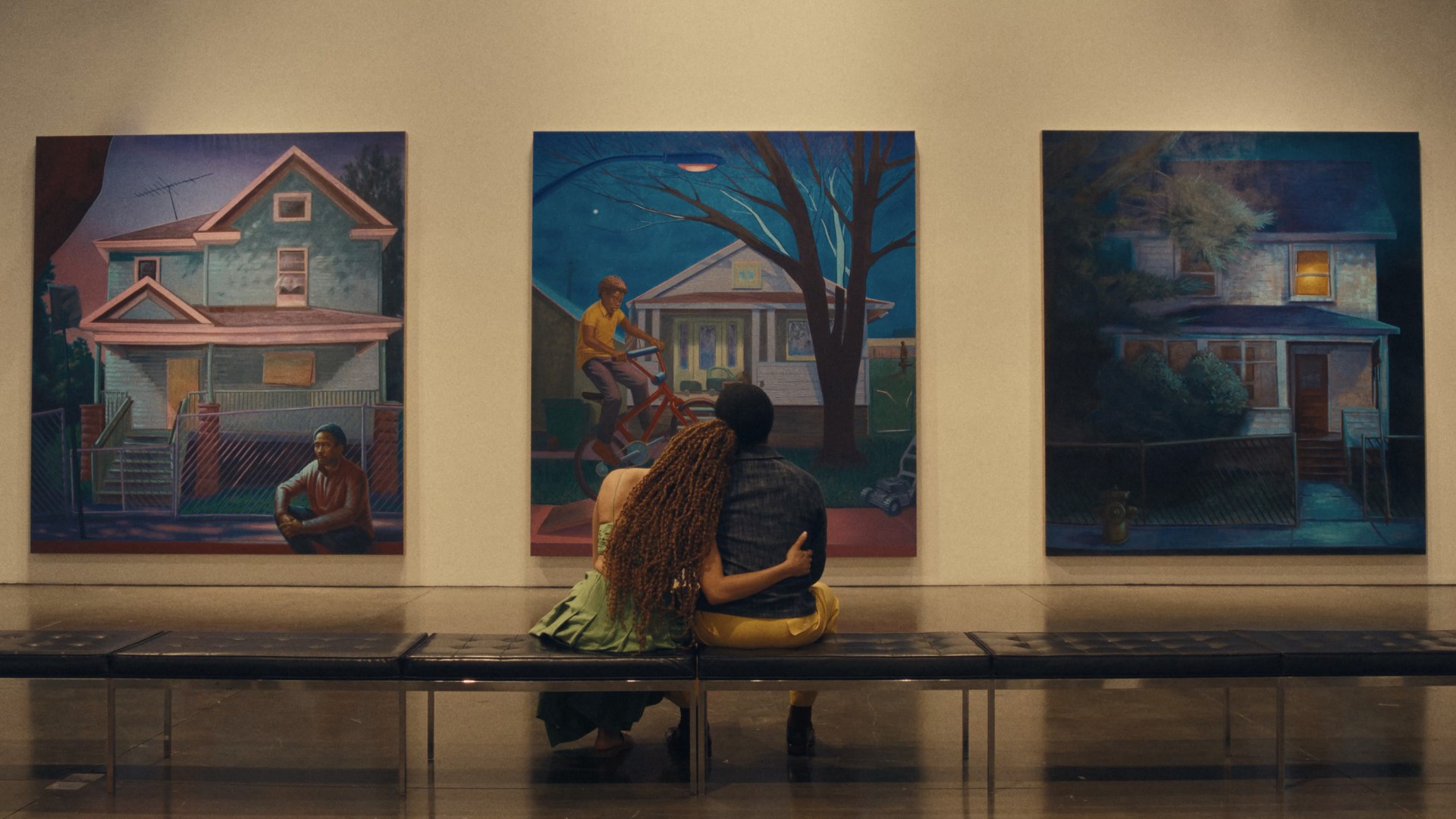Stories are an advertisement for the virtues we value. And today’s stories are dominated by narratives that glorify personal indignation and revenge: John Wick, The Bourne Identity, and practically any heist film.
Meanwhile, forgiveness often feels archaic. And many films that broach the subject can fail to capture the complexity of real-life absolution, which rarely comes with a cheap confession or an obvious transformation.
Titus Kaphar’s Exhibiting Forgiveness is a laudable exception in an era of justified anger. The protagonist, Tarrell, portrayed by André Holland, is a painter about to have his life interrupted by the return of his once abusive and drug-addicted father, La’Ron, played by John Earl Jelks. The soulful Andra Day plays Tarrell’s wife, Aisha, the psalmist who gives musical context to the family’s lament. (I endorse any excuse to have Andra Day sing, no matter how contrived.)
Tarrell is a celebrated painter. Much like his paintings, Exhibiting Forgiveness is intentional in its composition, designed to focus the viewer on what’s consequential. The mise en abyme of importance is that forgiveness, like art, requires sacrifice, audacity, and long-suffering.
Aside from being a reputable artist, Tarrell is a loving father to his son and a devoted husband to his wife. Despite these virtues, he cannot seem to outperform his past trauma. As Bessel van der Kolk states in The Body Keeps the Score, “We have learned that trauma is not just an event that took place sometime in the past; it is also the imprint left by that experience on mind, brain, and body.”
Tarrell believes he can shake his anguish without seeking help. His distress not only lives in his body, causing panic attacks, but also provides the impetus for his profound work.
The dilemma of art is that we can make something valuable while failing to resolve the pain that inspired it. Tarrell is loved by his agent—but possibly exploited. He is loved by consumers—which is a kind of voyeurism. Only a few are concerned with the soul behind the product.
The film presents its major conflict when Tarrell’s father returns, sober and saved, from a 15-year absence, seeking reconciliation from the son he neglected. Despite encouragement from Tarrell’s mother, Joyce, played by Academy Award nominee Aunjanue Ellis-Taylor, Tarrell refuses to entertain the idea. Joyce shares a litany of Scripture to warn her son about the self-destruction of unforgiveness—but those seeds fall among thorns. Now, we discover the flaw in our protagonist. He is tormented by his own pride.
If you’re expecting sophisticated apologetics in this film, you will be disappointed. Kaphar has presented us with everyday people. Joyce is that one aunt who believes the truth of the Bible in her bones better than she can articulate it with her tongue. La’Ron is that uncle who has experienced the transforming power of the Spirit and now texts Scripture to you every day. They are just as obnoxious with their virtues as they were with their vices. But they both appear to understand the power of Matthew 18:21–35.
In this passage, Jesus presents to his disciples a parable of forgiveness that is layered with warnings. A servant forgiven of an enormous debt refuses to forgive a fellow servant’s small debt, leading to his own punishment and showing that we must forgive others as God forgives us. Once the master learns of the servant’s unforgiveness, he hands him over to jailers. This is a stark reminder that unforgiveness is itself a form of torment, a cycle that keeps us chained to bitterness.
The ironic tragedy in Exhibiting Forgiveness is that by withholding forgiveness from someone who once tormented him, Tarrell is tormenting himself. His false liberation is actually a prison. As Nelson Mandela wisely stated, “Resentment is like drinking poison and then hoping it will kill your enemies.”
Tarrell chooses the torment of resentment rather than the liberation of forgiveness because he doesn’t want to appear weak. But Christian forgiveness isn’t weak. It’s not a simple act of “letting go” or ceasing to hold something against someone. True reconciliation isn’t merely the absence of accusations; it’s the restoration of relationships to a state that existed before the offense occurred. Tarrell’s father has acknowledged his offenses, has done the work of repair, and desires that restoration.
Forgiveness, like art, is never finished. It is a daily practice of revision, a constant reconstructing of our understanding of both ourselves and those who have hurt us.
And, like art, forgiveness requires skill. It’s something that must be cultivated—through prayer, through practice, and through patience. Forgiveness doesn’t yield instant results, but it does yield enduring peace.
I found myself both applauding Tarrell’s progress and feeling unsatisfied with where he ends up. Forgiveness is a radical act, one that goes beyond human instincts and societal norms—but Tarrell doesn’t get radical enough. Without spoiling the film, I’ll say that the humanist in me was indulged, but the Christian had more questions. One of those questions: “Who is true forgiveness for?”
In a text exchange about the movie, theologian and friend K. A. Ellis shared this with me about forgiveness:
I’m learning from persecuted Christians that forgiveness is not solely for the guilty or the offended; forgiveness also serves as a witness to a watching world. Imagine millions of faithful Christians throughout history who, at their lowest moments, have uttered the same words as Jesus when he was hung on the cross: “Forgive them, for they know not what they do.” Even as they’re physically punished, they pray forgiveness for those who hate and hurt them. … Such a thing is unfathomable apart from Christ.
Joyce encourages her son to be such a faithful witness. But she’s expecting the fruit of forgiveness from a tree that can only produce from the soil it was given. Tarrell was cultivated in anger and sorrow, but the very religion he mocks could be the rich ground he needs to flourish. In a moment of sincerity, he implores his father to continue to pray for him despite his refusing to embrace the biblical admonishment of his parents. His posture is “Be patient with me,” as the servant pleads in Matthew 18.
Exhibiting Forgiveness is an honest primer for the priesthood of believers. Some in the Black community might see the film as primarily dealing with the dysfunction of Black trauma. It could very well be that.
However, it can also be a kind of confession that leads to greater joy, fuller amnesty. This is artwork that can normalize forgiveness. As men reconcile with the trauma of their past, children will inherit the tools of emotional health, wives will rejoice, and our communities will witness redeemed portraits that reflect the forgiving Father in heaven.
It’s easy to get trapped in the colors of revenge and pain. Only through forgiveness can the full palette of life open up to us.
Sho Baraka is editorial director of Big Tent for Christianity Today.
























































